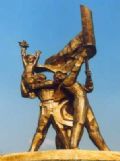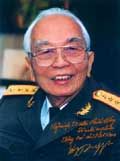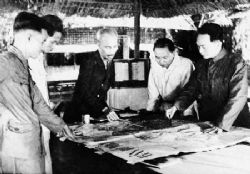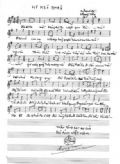|
|

President Ho Chi Minh,
the soul of the
resistance.

President Ho Chi Minh
chaired a Government
meeting at the Viet Bac
resistance zone.

General Vo Nguyen Giap,
Commander-in-Chief of the Dien Bien Phu
Campaign, and his staff.nbsp;

Attack to destroy Dien
Bien Phu complex of
fortified positions.nbsp;
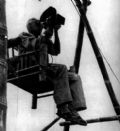
Roman Karmen shooting
a scene of the French
troops surrendering at
Dien Bien Phu.nbsp;

Meeting guerilla-women
in his film.

With
Vietnamese
cameramen who helped
him in making the film
“Vietnam”.
|
Roman Karmen, an eminent documentary-news film-maker of the former
Soviet Union, was present at many hot spots throughout the world,
including Spain (during the civil war), China (in the anti-Japan
resistance war), Myanmar, India and Cuba. In 1954, he came to Vietnam, a
burning spot, which was then attracting great attention from the whole
world, and made a documentary film, titled "Vietnam", which is now a
valuable asset of the Vietnamese people.
Before coming to Vietnam, R. Karmen had prepared for
himself a rich knowledge of Vietnam and its people. Hence, with his camera
he introduced truly and sincerely to the audience the country of Vietnam,
which was then not well known by many people in the world. It was a
peaceful countryside with thatch-roofed houses, rice fields and flying
white storks; a gentle river, bamboo hedges, rows of coconut trees laden
with fruit. The country had a traditional culture thousands of years old,
with its brilliant symbol, Van Mieu (Temple of Literature) and Quoc Tu
Giam (First National University). This country and its people had
suffered, for almost a century, under the yoke of the French colonialists,
in their prisons or with a starving life, in which the fathers and their
sons had in turns to pull the plough instead of the buffaloes. But then,
the people of this country, millions as one, shared a common oath, i.e.
"we rather sacrifice ourselves than to live in slavery", and together they
stood up to fight the invaders for national independence.
The entire
nation embarked on the resistance war to defend national independence and
unification. R. Karmen reflected the Vietnamese people’s staunch will
through vivid and truthful scenes. Under the bombs and shells
anti-illiteracy classes were opened in many hamlets and villages, that
reflected the yearning desire for learning of this nation. Along with the
resistance war against the foreign invaders, there was a fight against the
feudal regime to take back the land and give it to the farmers.
R. Karmen
reserved a rather long part in his film to describe the Vietnamese
people's sacred resistance war, with fights to attack the enemy's posts
and destroy them on Highway 5. But the most notable scenes were about the
historical campaign of Dien Bien Phu. The whole country joined in the
fighting: the army men, the artilleries - big and small, the labourers who
carried goods on their shoulders or transported commodities and weapons
with pack-bikes, by boats or bamboo rafts, to the battle front. R. Karmen
recorded scenes of the army men hauling the artillery, tonnes of weight
each, over the mountain slopes - an extremely heavy task. He also captured
images of General Vo Nguyen Giap, the Commander-in-Chief of the Campaign,
working with his staff in the Command Post at Muong Phang. At the time
when the Vietnamese people celebrated the 50th anniversary of the Dien
Bien Phu Victory, they were very happy to watch R. Karmen's film "Vietnam"
on television. They had a chance to see again a soldier upholding a
victorious flag on the top of the command bunker of the French General De
Castries, together with a long line with more than ten thousand French
prisoners surrendering. R.Karmen's camera lens focused on the sad and
frightened faces of the French troops, who had just escaped from death.
Showing them, R.Karmen put a question: "For whom did they fight?" and then
he gave an answer: "They are merely mercenaries for a unjust war."
Watching
R.Karmen's film, the Vietnamese audience was deeply moved to see President
Ho Chi Minh, together with other leaders, including Truong Chinh and Pham
Van Dong, working in the thatch-roofed and bamboo walled "Presidential
Palace" in the Viet Bac resistance zone. The President looked simple, yet
very brisk, proving his wisdom and courage and he was the soul of the
resistance.
In October
1954, from the Viet Bac resistance zone, R.Karmen came to Hanoi. He
witnessed the Vietnamese army men taking power from the French. The
streets were quiet, and there were only French troops preparing to
withdraw from the city. The scene of the last French troops withdrawing
from Hanoi across the Long Bien Bridge brought to a close the
colonialists' scheme of invasion. Then came the next scene of Hanoi full
of flowers and flags, and people who were happy to welcome the soldiers of
the Capital Regiment. Nine years before, those soldiers had quietly
crossed the Red River and left Hanoi for the Viet Bac resistance zone to
wage a long resistance war. The audience was deeply moved by these scenes
recorded by R. Karmen. With only 70 minutes of film, R. Karmen was
successful in introducing to the world the country of Vietnam, with a
culture of thousands of years old, and its people who were brave and
heroic, and who would never live in slavery.
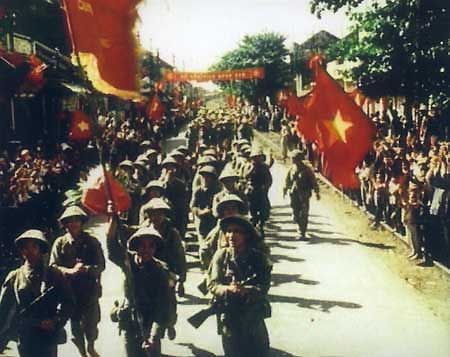
Welcoming Uncle Ho’s soldiers back to Hanoi
capital on the liberation day -October 10,
1954. |
Fifty years ago, the film "Vietnam"
by R.Karmen was widely shown in Northern Vietnam, under the name "Vietnam
on the victorious path". This year, on the 50th anniversary of the Dien
Bien Phu Victory, the Vietnamese people nationwide had a chance again to
watch on television the colour version and enjoyed seeing the glorious
time of the nation.
Roman Karmen
is no more. Of the Vietnamese associates helping R. Karmen make the film,
including Mai Loc, Hong Nghi, Quang Huy and Tien Loi, and his literature
advisor, writer Nguyen Dinh Thi, some have died. But the valuable
documentary of Vietnam recorded by R. Karmen will be alive
forever.
Story: Le
Sonnbsp; - Photos: File and from the film “Vietnam” by
Roman Karmen
|
Roman Karmen’s memoirs of President Ho
Chi Minh

President Ho Chi Minh and Roman Karmen at the Viet
Bac resistance base.
|
“In all hardest periods
of the struggle, the flag for millions of Vietnamese people is the
brilliant name of Ho Chi Minh. Inside of the modest appearance are
the great objectives of the people, who struggle for freedom.”
(Roman Karmen)
In his memoirs, Roman Karmen expressed a huge
regard for President Ho Chi Minh. He wrote: “There are meetings that
are engraved in one’s mind for the whole life and leave a deep and
incomparable imprint in the soul and the most inner part of the
heart. One of them was the meeting between Ho Chi Minh and us. We
went along a small path, an abyss, and passed through a forest of
bamboo, palm and wild banana trees and we saw a thatched roof. From
the terrace of the thatched hut, a man in farmer’s costume
approached us. If we had met him a few days earlier on the path or
in the field, we surely would have thought that he was a common
farmer.”
President Ho Chi Minh
paid much attention to R. Karmen’s work and asked everyone to
provide the best conditions for him to work. He did not allow R.
Karmen to take a car in the daytime to ensure the complete safety
for the film-making crew. Only one thing that President Ho Chi Minh
suggested to R. Karmen was that the cameraman should record more
images of Vietnamese people, who gained the historical
feats-of-arms.
R. Karmen said that
he and President Ho Chi Minh talked and exchanged views with each
other in Russian for a full day. When being asked whether Russian
was difficult or not, the President said: “A revolutionary has to
master the language of Lenin”.
Story:
Duong Trung
Quoc | |


